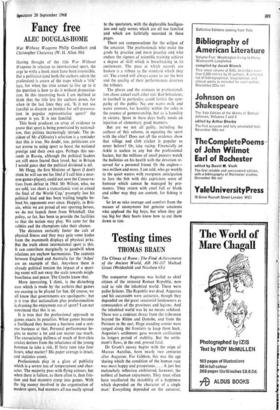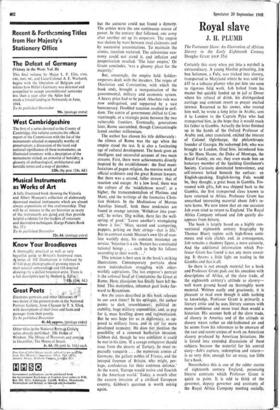Testing times
THOMAS BRAUN
The conqueror Augustus was hailed as chief citizen of the restored Roman Republic, now said to 'rule the inhabited world. These were polite fictions. The Republic was dead. Augustus and his successors were autocrats, though they depended on the` great senatorial landowners as commanders of the provinces and legions. And the inhabited world was by no means subdued. There was a coo Cant threat from the tribesmen beyond the Rhine and Danube, and from the Persians in the east. Huge standing armies were ranged along the frontiers to keep them back. Augustus's settlement gave western civilisation its longest period of stability. But the settle- ment's flaws, in the end, proved fatal.
Dr Grant's survey begins with the reign of Marcus Aurelius, born nearly two centuries after Augustus. For Gibbon, this was the age `during which the condition of the human race was most happy =and prosperous.... A just but melancholy reflection embittered, however, the noblest of human enjoyments. They must often have recollected the instability of a happiness which depended on the character of a single man.' Everything depended on the autocrat; but the autocrat could not found a dynasty. The armies were the one continuous source of power. In the century that followed, one army after another set up its emperors. The empire was shaken by wars between rival claimants and by successive assassinations. To maintain the armies, taxation rocketed. The subsistence eco- nomy could not stand it, and inflation and pauperisation resulted. 'The later empire,' Dr Grant concludes, 'was a gloomy place for the majority.'
But, amazingly, the empire held. Soldier- emperors dealt with the invaders. The reigns of Diocletian and Constantine, with which the book ends, brought a reorganisation of the governmental, military and economic system.
A heavy price had to be paid. Absolute rule was now undisguised, and supported by a vast bureaucracy. Doubled taxation resulted in serf- dom. The centre of government shifted to Con- stantinople, at a strategic point between the two vulnerable frontiers. Eventually, generations later, Rome succumbed, though Constantinople lasted another millennium.
The author has chosen his title deliberately: the climax of Rome was the age when the empire stood the test. It is also a fascinating age of cultural development. The book-gives an intelligent and successful account of two main streams. First, there were achievements directly inspired by the establishment: the final mani- festations of pagan religion, the massive work of official architects and the great Roman lawyers.
But there was a second, fuller stream: that of reaction and escape. At a low level, there was the culture of the 'middlebrow novel'; at a higher, the transcendentalism of Plotinus and
Mani, and the writings of the formative Chris- tian thinkers. In the Meditations of Marcus
Aurelius himself, both these tendencies are found in strange tension. 'Withdraw into your- self,' he writes. 'Dig within, there lies the well- spring of good.' Leave another's wrongdoing where it lies."Mice, scared and scampering, puppets, jerking on their strings—that is life.'
But in contrast stands Marcus's own life of reso- lute worldly duty, his constant insistence on service. 'Injustice is a sin. Nature has constituted rational beings . . . each to help his fellows according to their worth ...'
This tension is best seen in the book's striking illustrations. Contemporary portraits show stern individualism struggling with other-
worldly aspirations. The last emperor's portrait is the colossal head of Constantine the Great at Rome, Here, classicism has finally been left be- hind. This motionless, inhuman gaze looks for- ward to Byzantium.
Are the years described in this book releVant to our own times? In his epilogue, the author points to dark 'resemblances: political in-
stability, huge, military expenditure, and, to pay for it, mass levelling down and regimentation. But he sees hope for us in diplomacy, as, op- posed to military force, and in ouf far more developed economy. He does not mention the possibility of a renewed barbarian invasion. Gibbon did, though he was confident it-could be met in his time. 'If a savage conqueror should.
issue from the deserts of Tartary, he must' re- peatedly vanquish . . . the numerous armies of Germany, the gallant nobles Of. France, and the
intrepid freemen of Britain, who might, per- haps, confederate for their common defence.'
At the worst, 'Europe would revive and flourish in the American world.' Today, a month after the eastern invasion of a civilised European country, Gibbon's question is worth asking again.











































 Previous page
Previous page